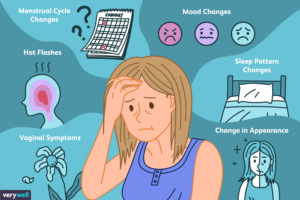Understanding Early Menopause
Menopause is a natural part of a woman’s life, typically occurring in the late 40s to early 50s, marking the end of menstrual cycles and fertility. However, some women experience early menopause, which occurs before the age of 40. This early onset can be distressing, not only due to physical changes but also due to the emotional and psychological effects it can have. Understanding the causes of early menopause and exploring possible solutions is essential for managing this transition with confidence and well-being.
What is Early Menopause?
Early menopause, also referred to as premature menopause, occurs when a woman’s ovaries stop functioning before the age of 40. This leads to a cessation of menstruation and a drop in the production of estrogen and progesterone, hormones crucial for fertility and reproductive health. As a result, a woman may experience symptoms similar to natural menopause, including hot flashes, night sweats, mood swings, vaginal dryness, and sleep disturbances.

Causes of Early Menopause
The causes of early menopause can vary, and in many cases, the specific reason remains unknown. However, several factors are associated with the onset of early menopause:
- Genetics: Family history plays a significant role. If a woman’s mother or sister experienced early menopause, she may be more likely to experience it as well. Genetic factors can affect how early menopause develops.
- Autoimmune Disorders: Conditions where the immune system mistakenly attacks the body’s own tissues, such as rheumatoid arthritis or thyroid disease, can affect ovarian function and lead to early menopause.
- Chemotherapy and Radiation: Treatments for cancer, particularly chemotherapy and radiation, can damage the ovaries and lead to early menopause. The extent of the damage depends on the age of the woman, the type of treatment, and the location of radiation.
- Surgical Removal of Ovaries: If a woman undergoes surgery to remove the ovaries (oophorectomy), either as part of treatment for cancer or other health issues, she will experience an immediate menopause.
- Chromosomal Abnormalities: Women with certain chromosomal disorders, such as Turner syndrome or Fragile X syndrome, may be more likely to experience early menopause due to an impaired ovarian function.
- Lifestyle Factors: Although not as common, lifestyle factors such as smoking can increase the risk of early menopause. Studies have shown that women who smoke may experience menopause up to two years earlier than non-smokers.
- Infections: Certain infections, such as mumps or tuberculosis, may affect ovarian function and contribute to early menopause.
Symptoms of Early Menopause
The symptoms of early menopause are similar to those of natural menopause but occur at a much younger age. These can include:
- Hot Flashes and Night Sweats: Sudden feelings of warmth, often accompanied by sweating, especially at night.
- Irregular or Missed Periods: A common sign that menopause is approaching, often a few years before it fully occurs.
- Vaginal Dryness: Decreased estrogen levels can lead to reduced lubrication, causing discomfort during intercourse.
- Mood Changes: Emotional changes, including irritability, anxiety, or depression, can be triggered by hormonal fluctuations.
- Sleep Disturbances: Difficulty falling or staying asleep, often related to night sweats.
- Reduced Fertility: A decline in fertility as ovarian function diminishes.
Solutions and Treatments for Early Menopause
While early menopause can feel overwhelming, there are ways to manage the symptoms and maintain a healthy lifestyle. Treatment options vary depending on the individual’s health, symptoms, and desires for family planning.
- Hormone Replacement Therapy (HRT): One of the most common treatments for early menopause is hormone replacement therapy, which involves replacing the hormones (estrogen and progesterone) that the ovaries no longer produce. HRT can help relieve symptoms like hot flashes, vaginal dryness, and mood swings. However, it is important to discuss potential risks, such as blood clots or breast cancer, with a healthcare provider.
- Alternative Therapies: Some women seek alternative therapies like herbal supplements, acupuncture, or yoga to help manage symptoms. While these may offer relief for some, it is important to speak with a doctor before trying alternative treatments, as their effectiveness can vary and may not be scientifically proven.
- Lifestyle Changes: Regular physical activity, a balanced diet rich in calcium and vitamin D, and stress management can help mitigate some symptoms of early menopause. Exercise can improve mood, reduce stress, and promote overall health, while a healthy diet can support bone health, which becomes increasingly important after menopause due to the risk of osteoporosis.
- Fertility Preservation: For women experiencing early menopause who wish to have children, fertility preservation options like egg freezing can be considered before ovarian function fully ceases. This allows for the possibility of pregnancy later through assisted reproductive technologies like in vitro fertilization (IVF).
5. Counseling and Support: Dealing with the emotional impact of early menopause can be challenging. Seeking counseling or joining support groups can provide emotional support and help women manage the psychological effects of premature menopause, such as depression or anxiety.
Conclusion
Early menopause can be a challenging and unexpected experience, but it is important to remember that there are effective treatments and solutions available to manage the symptoms and improve quality of life. Whether through hormone replacement therapy, lifestyle changes, or emotional support, women can find ways to embrace this new phase of life with confidence. If you or someone you know is experiencing early menopause, it’s essential to seek medical advice to explore the best treatment options tailored to individual needs.
